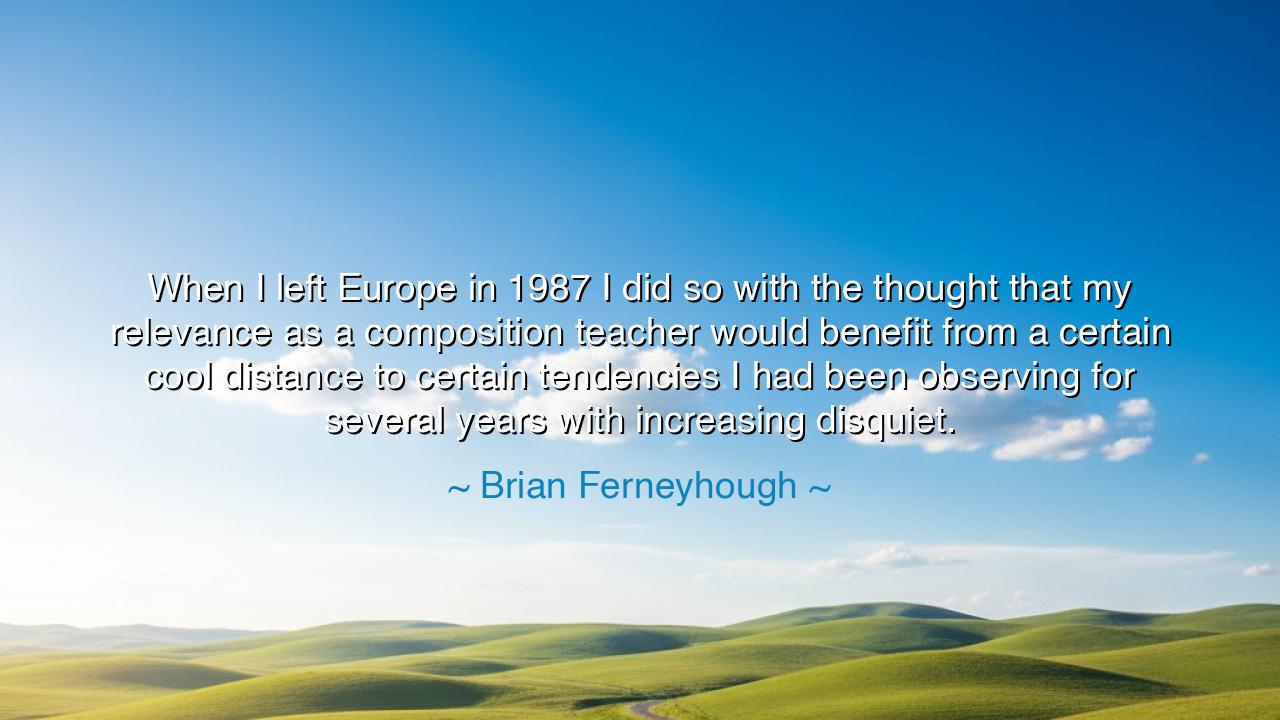
When I left Europe in 1987 I did so with the thought that my
When I left Europe in 1987 I did so with the thought that my relevance as a composition teacher would benefit from a certain cool distance to certain tendencies I had been observing for several years with increasing disquiet.






In the words of Brian Ferneyhough, we are given a glimpse into a moment of self-reflection and strategic distance in his journey as a composition teacher. By leaving Europe in 1987, Ferneyhough sought to create a space for himself—a cool distance from certain trends in the world of composition that had begun to disquiet him. His decision to step away was not an act of abandonment, but rather one of clarification and preservation of his artistic integrity. Ferneyhough believed that by removing himself from the immediate influences of his environment, he could continue to teach with greater relevance, offering his students a fresh perspective free from the potentially stifling influences of the trends he observed around him.
This desire for distance and clarity has deep roots in the wisdom of the ancients. The idea of retreating to gain perspective is central to many of the great traditions of self-examination and personal growth. In ancient Greece, the philosopher Socrates often retreated into solitude in order to engage in deep reflection and refine his thoughts. It was in these moments of distance from the hustle of daily life that Socrates was able to develop his method of dialogue and hone his ideas about ethics and knowledge. By stepping away from the distractions of the world, he was able to engage in deeper understanding. Similarly, Ferneyhough's decision to remove himself from the European composition scene was a way of reclaiming his voice and focusing on what he truly believed was important in his teaching.
The story of Confucius offers another example of this idea of distance for clarity. Confucius spent much of his life traveling from state to state, seeking a place where his ideas could be put into practice. His departure from his homeland was not an escape, but a conscious decision to distance himself from political corruption and the constraints of the systems he found oppressive. In his travels, Confucius sought a place where he could teach freely and cultivate the virtues he believed were essential for a harmonious society. Much like Ferneyhough, Confucius recognized that to truly teach and influence, one must sometimes step away from prevailing trends and environments to preserve and express one’s deepest convictions.
Ferneyhough's words also resonate with the story of Leonardo da Vinci, whose innovative genius often put him at odds with the more traditional thinkers of his time. Like Ferneyhough, da Vinci understood the importance of distance from the status quo in order to truly innovate. He spent much of his life studying nature and engaging in independent experimentation, often disregarding established methods in favor of developing his own unique approach to art and science. Da Vinci’s legacy is a testament to the power of stepping outside conventional wisdom to bring fresh ideas into the world. Similarly, Ferneyhough’s decision to leave Europe and gain distance from the trends he found disquieting reflects a commitment to intellectual independence and artistic authenticity.
The lesson here is one of clarity and self-preservation. In the pursuit of any meaningful work—whether in teaching, art, or philosophy—it is essential to occasionally distance oneself from the prevailing trends and expectations in order to maintain one’s own integrity and voice. Clarity often arises not from immediate engagement, but from stepping back, reflecting, and finding what truly resonates with one’s personal beliefs and understanding. Ferneyhough’s decision to step away was a recognition that, in order to teach effectively and creatively, one must be rooted in one’s own convictions, free from the external pressures that can cloud judgment and dilute the message.
In practical terms, we must also seek to create space for ourselves when necessary. Whether in our careers, relationships, or creative endeavors, there are times when we need to step back, gain perspective, and reconnect with our true purpose. Just as Socrates and Confucius distanced themselves from the world around them to refine their ideas, we too must be willing to create moments of solitude and self-reflection in order to reconnect with what is truly important. Growth and innovation often arise from periods of thoughtful separation, when we allow ourselves the freedom to consider new ideas, challenge old assumptions, and move forward with a clearer vision.
Thus, let us learn from Ferneyhough’s example and embrace the idea that sometimes, distance from the prevailing trends is not a sign of retreat but of growth. Let us give ourselves permission to step away, to find clarity, and to reclaim our own voices, knowing that the wisdom we gain from such periods of reflection will enable us to teach, create, and lead with greater authenticity and purpose. Whether we are navigating the complexities of modern life or engaging in deep creative endeavors, the ability to step back and reorient ourselves can be the key to finding the truth that lies beneath the surface of the noise around us. Distance, when used wisely, becomes not a barrier but a bridge to a richer, more meaningful engagement with the world.






AAdministratorAdministrator
Welcome, honored guests. Please leave a comment, we will respond soon